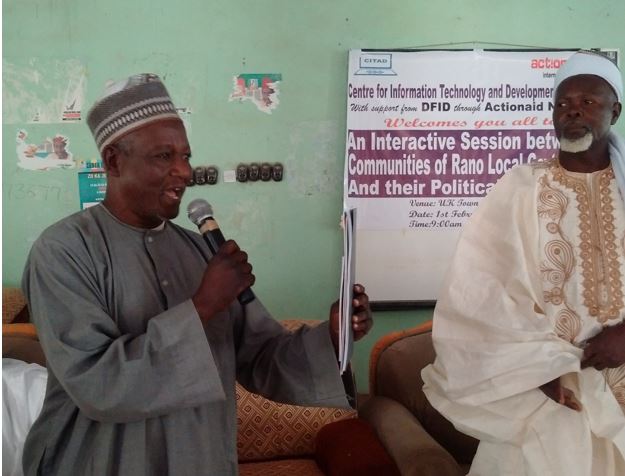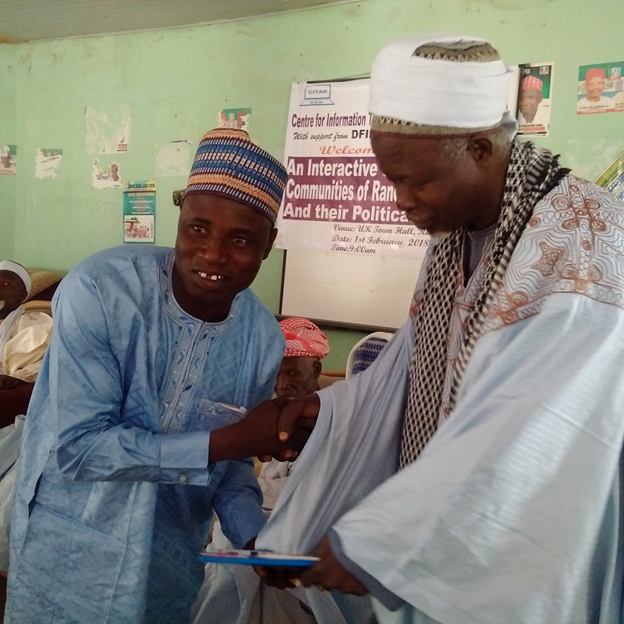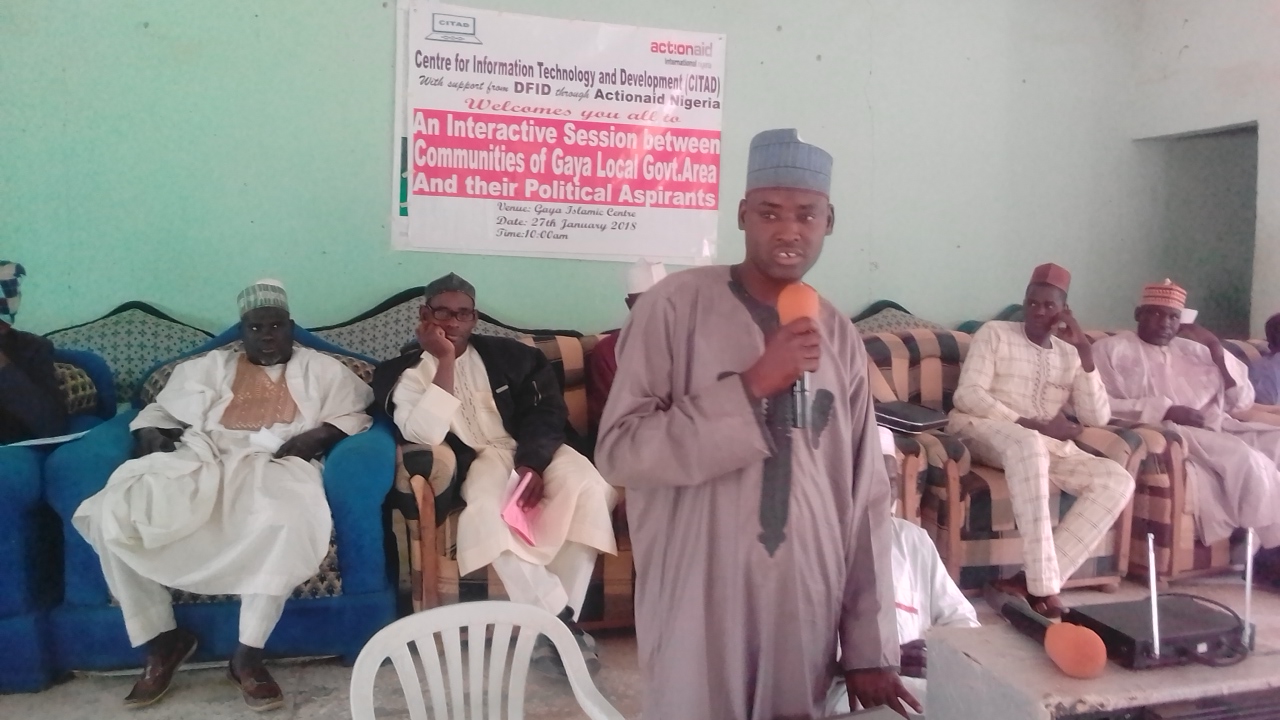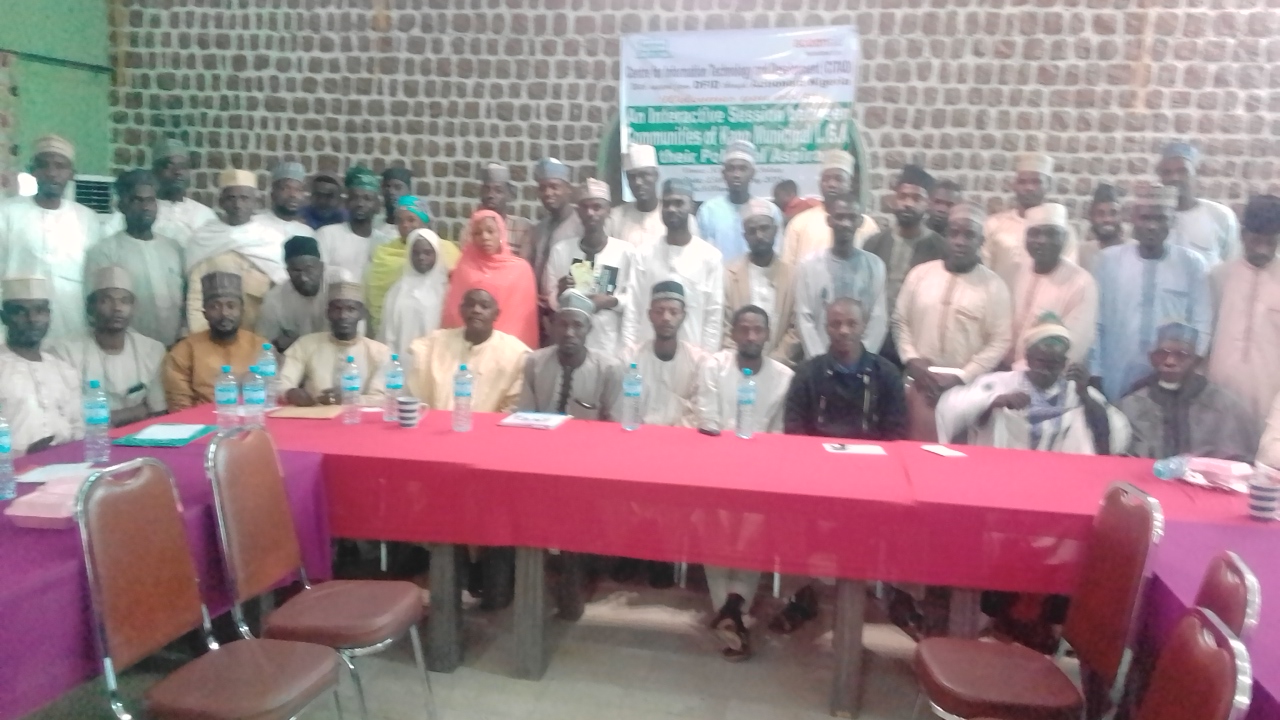Y.Z Ya’u Executive Director, CITAD.
The campaign against hate speech in Nigeria has gathered momentum, says Y.Z Ya’u,  the Executive Director Of Centre For Information Technology And Development (CITAD).
He made this assertion in Bauchi at a press conference at the end of a one-day hate speech project evaluation meeting  Friday Ya’u said “We are happy that the campaign against hate speech has gathered momentum as it has moved from our lone voice to a multiplicity of voices, including government agencies such as the National Orientation Agency (NOA) which has since last year commenced a nationwide sensitization programme on hate. We also note with satisfaction that some of the media regulatory agencies, especially the Nigeria Broadcasting Commission, have begun the process of reviewing their laws to take on board the need to deal with hate speech in the media.
“In our last meeting with the House Committee on National Security and Intelligence, they also resolved to introduce a hate speech bill to the National Assembly using the draft that was produced by the Interfaith Centre, Kaduna. We note also the statement by government to monitor hate speech online(although we would like to see a more detailed strategy on how that will be done, otherwise we enter our reservation). Our monthly social media campaign against hate speech competition has been producing encouraging peace messages from young people who are on the social media that are serving not only to counter hate speech but also to sensitize communities that peace building is a collective responsibility. We are equally happy with the state ministries of education, a number of which are present at this evaluation meeting, who have signed a memorandum of understanding with us to operate peace clubs in their secondary schools so that their students can be socialized into the imperative of peace building. We have produced a number of policy briefs that we think would help policy makers to take policy initiatives and processes that would address the incidence of hate speech in our country.
He however warned that, “In spite of these successes we observe that in recent times, there is a resurgence of hate speech across the country. This hate speech, as our monitoring has shown,centered around our religious and ethnic diversities. More than before, the country is becoming more and more divided. Unless all stakeholders work against this trend, it will continue to expand as we move towards 2019 general elections. Such expansion if not checked would make the elections to become violent. This would compound the situation that is already seeing many communal clashes in the country in addition to the continuing mayhem by the Boko Haram insurgents in the north east. This is why we would like to offer our suggestions on how to respond to of the some of the challenges that hate speech presents to the country.
Read the text of the briefing below:
TEXT OF PRESS CONFERENCE ADDRESSED BY Y. Z. YA’U, EXECUTIVE DIRECTOR OF CENTRE FOR INFORMATION TECHNOLOGY AND DEVELOPMENT (CITAD) AT THE END OF A ONE-DAY HATE SPEECH PROJECT EVALUATION MEETING HELD AT COMMAND GUEST HOUSE, BAUCHI ON FRIDAY 26, 2018
On behalf of CITAD and our partners, including Ministries of Education from Kano, Yobe, Bauchi, Taraba, Gombe and Jigawa States as well as members of the Students for Peace from various tertiary institutions and Peace Ambassadors/Peace Club Advisers from different states of the federation, welcome you to this press conference which marks the end of our Annual Evaluation Meeting of the Hate Speech Project. The Hate Speech, being supported by the MacArthurFoundation, has the objectives:
Raise public awareness on hate speech through sensitization forums to get the people to understand the danger of hate speech and how to respond to it.
Engage Stakeholders to generate recommendations and strategies for strengthening the existing media regulations and standards to prevent hate speech;
Monitoring and documentation of hate speech across multiple media platforms to inform data based advocacy and policy engagement to curb hate speech
On the basis of the monitoring, deploy a robust countering of dangerous speech using a variety of methods.
Expanding the peace clubs and students for peace initiatives into a national youth for peace movement to lead advocacy and campaign to improve regulation and policy frameworks for media and journalism in the country.
The aim of the evaluation meeting was to enable us assess the implementation of the project, identify its successes and challenges, gains and success stories and propose new directions to ensure that we consolidate on the progress being made. Among the key activities of the project are the monitoring of hate speech daily on social and print media, countering of hate speech, advocacy to enlist the voices of influential people to join the campaign against hate speech, public sensitization and media engagement to enlighten people againstindulging in hate speech and being provoked it; and orientating students in both tertiaryand secondary schools to engage in the campaign against hate speech.
We are happy that the campaign against hate speech has gathered momentum as it has moved from our lone voice to a multiplicity of voices, including government agencies such as the National Orientation Agency (NOA) which has since last year commenced a nationwide sensitization programme on hate. We also note with satisfaction that some of the media regulatory agencies, especially the Nigeria Broadcasting Commission, have begun the process of reviewing their laws to takeon board the need to deal with hate speech in the media. In our last meeting with the House Committee on NationalSecurity and Intelligence, they also resolved to introduce a hate speech bill to the National Assembly using the draft that was produced by the Interfaith Centre, Kaduna. We note also the statement by government to monitor hate speech online(although we would like to see a more detailed strategy on how that will be done, otherwise we enter our reservation). Our monthly social media campaign against hate speechcompetition has been producing encouraging peace messages from young people who are on the socialmedia that areservingnotonly to counter hate speech but also to sensitize communities that peace building is a collectiveresponsibility. We are equally happy with the state ministries of education, a number of which are present at this evaluation meeting, who have signed a memorandum of understanding with us to operate peace clubsin their secondary schools so that their students can be socializedinto the imperative of peace building. We have produced a number ofpolicybriefs that we think would helppolicymakers to take policyinitiatives and processes that would address the incidence of hate speech in our country.
In spite of thesesuccesses we observe that in recent times, there is a resurgence of hate speech across the country. This hate speech, as our monitoring has shown,centered around our religious and ethnic diversities. More than before, the country is becoming more and more divided. Unless all stakeholders work against this trend, it will continue to expand as we move towards 2019 general elections. Such expansion if not checked would make the elections to become violent. This would compound the situation that is already seeing many communal clashes in the country in addition to the continuing mayhem by the Boko Haram insurgents in the north east. This is why we would like to offer our suggestions on how to respond to of the some of the challenges that hate speech presents to the country.
In order to effectively address the prevalence of hate speech in the country, we must understand the dynamics of hate speech generation and spread. This requires identification of the key drivers of hate speech, the channels through which hate speech propagates and response or lack of it by relevant agencies that have responsibilities to stop hate speech from spreadingin the country.
From our analysis, the majordrivers of hate speech in the country include:
Perceived marginalization by differentgroups of people and communities across the country
The failure of government to carry on with its anti-corruption agenda in a transparentand impartial manner
The opacity in government in spite of the Freedom of Information Act which makes people to consume rumours as they seek to make sense of government actions
The risinglevel of povertyin the country that is pushing many people to the marginal spaces of hopelessness and criminality
The inability of government to help communities to resolve communal conflicts such as the farmer-herdsmen conflict,
The deliberate capitalization by some of politicians to profit from the current difficulties in the country by encouraging hate speech
These drivers of hate speechprovide the context and even the substance for the generation and spread of hate speech in the country. This hate speech finds outlet in the social media, the print,broadcast and increasingly in religious spaces (such as mosques, churches and shrines) as well as in secular spaces such markets, schools, community halls, etc.
The ease with which hate speech finds space to propagate in these channels is due to these key factors:
The weak regulatory frameworks which do not take into account the problem of hate speech
The lack of politicalwill, and in many occasions, the partiality of both regulatory agencies and media gatekeepers
The lack of accountability in all its ramifications from government at all levels
The low appreciation and understanding of the dangers of hate speech among the public and the fact that increasing rise of the culture of intolerance of legitimate criticism
The deployment of hatespeech as a gratuitous campaign tool by politicians who rather than be punished for using hate speech end up profiting from it
The hesitant, if not mute voice of traditional, religious and other community leaders to speak loudly against hate speech.
Against these, we recommend as follows:
Governmentmust be consistent, impartial, transparent and consultative in the way in which it is prosecuting its programmes, including the anti-corruption agenda
That all media regulatory agencies mustwake up to their responsibilities of ensuringeffective and full implementationof all the laws and regulations governing the media space so that media organizations, individuals and advertisers who deploy hate speechare promptly sanctioned
That the review of mediaregulatory frameworks that has commencement with the revision of the National Broadcasting Code should be done across all instruments and by all the agencies to ensure that they have mainstreamedstrategies and mechanisms to effectively deal with hate speech in these regulatory frameworks
That there is the need to review the national peace architecture to provide for the establishment of a national peace commission with the mandate to promote peace building, resolution conflicts and engenderinga culture of communitydialogue at all levels
The legislation to regulate preaching as well as provide clear framework for the teachingof religious studies that will be in consonant with our national aspiration for a peaceful and united country be enacted
The need to support communities to engage in dialogue with a view to resolving theirconflicts than leaving them to spiral into violentconfrontations and bloodshed
There is need to mainstream peace education in the civic education component of the secondary school education curriculum in the country
We would like to conclude by calling on religious and community leaders to speak out against hate speech, to condemn all those who engage in hate speech and to ensure that they do not themselves condone hate speech in their spaces. We call on the media to not only join the campaign against hate speech but also ensure that they do not provide space for hate speech to be carried and propagated in their spaces. We call on political parties to not only shun hate speech but also sign up to the voluntary campaign declaration on hate speech which we will launch shortly that will commit them to disqualify any politician seeking for nomination on their platforms for election for engaging in hate speech. We urge the National Human Rights Commission to continue with hearing and documentation of cases filed against some politicians who deployed hate speech in the 2015 general elections with a view to not only prosecuting them but also enrolling them to a hall of shame that will serveas disincentive for hate speech by politicians. We call on civil society organizations to continue to promote and support inter-faith and inter-ethnic dialogues aimed at promoting national understanding, inter-faith solidarity and national cohesion as well as keep monitoring media regulatory agencies to ensure that they discharge their mandates impartially, effectively and promptly. Finally we note that hate speech catalyze violence only if citizens indulge it or are provoked by it. We therefore call on people to not indulge in hate speech and not be provoked by it. That is the key principle for inoculating people against hate speech that ultimately is the most effective anti-dote against hate speech…

















